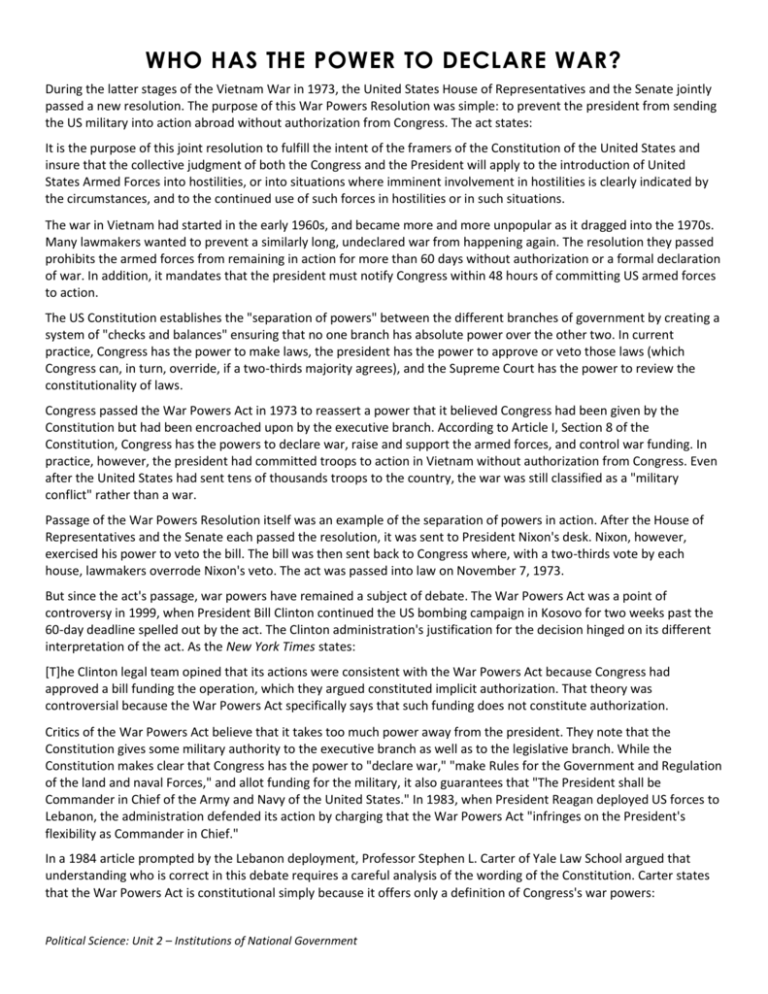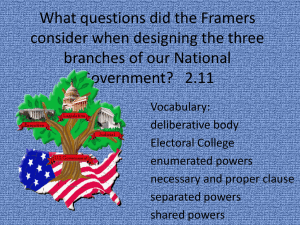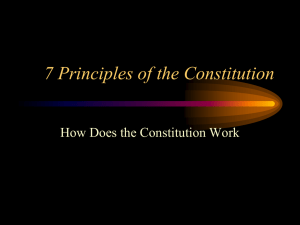War Powers Act
advertisement

WHO HAS THE POWER TO DECLARE WAR? During the latter stages of the Vietnam War in 1973, the United States House of Representatives and the Senate jointly passed a new resolution. The purpose of this War Powers Resolution was simple: to prevent the president from sending the US military into action abroad without authorization from Congress. The act states: It is the purpose of this joint resolution to fulfill the intent of the framers of the Constitution of the United States and insure that the collective judgment of both the Congress and the President will apply to the introduction of United States Armed Forces into hostilities, or into situations where imminent involvement in hostilities is clearly indicated by the circumstances, and to the continued use of such forces in hostilities or in such situations. The war in Vietnam had started in the early 1960s, and became more and more unpopular as it dragged into the 1970s. Many lawmakers wanted to prevent a similarly long, undeclared war from happening again. The resolution they passed prohibits the armed forces from remaining in action for more than 60 days without authorization or a formal declaration of war. In addition, it mandates that the president must notify Congress within 48 hours of committing US armed forces to action. The US Constitution establishes the "separation of powers" between the different branches of government by creating a system of "checks and balances" ensuring that no one branch has absolute power over the other two. In current practice, Congress has the power to make laws, the president has the power to approve or veto those laws (which Congress can, in turn, override, if a two-thirds majority agrees), and the Supreme Court has the power to review the constitutionality of laws. Congress passed the War Powers Act in 1973 to reassert a power that it believed Congress had been given by the Constitution but had been encroached upon by the executive branch. According to Article I, Section 8 of the Constitution, Congress has the powers to declare war, raise and support the armed forces, and control war funding. In practice, however, the president had committed troops to action in Vietnam without authorization from Congress. Even after the United States had sent tens of thousands troops to the country, the war was still classified as a "military conflict" rather than a war. Passage of the War Powers Resolution itself was an example of the separation of powers in action. After the House of Representatives and the Senate each passed the resolution, it was sent to President Nixon's desk. Nixon, however, exercised his power to veto the bill. The bill was then sent back to Congress where, with a two-thirds vote by each house, lawmakers overrode Nixon's veto. The act was passed into law on November 7, 1973. But since the act's passage, war powers have remained a subject of debate. The War Powers Act was a point of controversy in 1999, when President Bill Clinton continued the US bombing campaign in Kosovo for two weeks past the 60-day deadline spelled out by the act. The Clinton administration's justification for the decision hinged on its different interpretation of the act. As the New York Times states: [T]he Clinton legal team opined that its actions were consistent with the War Powers Act because Congress had approved a bill funding the operation, which they argued constituted implicit authorization. That theory was controversial because the War Powers Act specifically says that such funding does not constitute authorization. Critics of the War Powers Act believe that it takes too much power away from the president. They note that the Constitution gives some military authority to the executive branch as well as to the legislative branch. While the Constitution makes clear that Congress has the power to "declare war," "make Rules for the Government and Regulation of the land and naval Forces," and allot funding for the military, it also guarantees that "The President shall be Commander in Chief of the Army and Navy of the United States." In 1983, when President Reagan deployed US forces to Lebanon, the administration defended its action by charging that the War Powers Act "infringes on the President's flexibility as Commander in Chief." In a 1984 article prompted by the Lebanon deployment, Professor Stephen L. Carter of Yale Law School argued that understanding who is correct in this debate requires a careful analysis of the wording of the Constitution. Carter states that the War Powers Act is constitutional simply because it offers only a definition of Congress's war powers: Political Science: Unit 2 – Institutions of National Government The War Powers Resolution is nothing more or less than a congressional definition of the word "war" in article I. A definition of this kind coupled with a reasonable enforcement mechanism is well within the power of Congress under a proper understanding of the constitutional system of checks and balances. The definition does not intrude on any presidential prerogative. Despite such legal arguments, the question of who has the power to wage war remains a contentious issue in Washington. Questions: 1. For what reason was the War Powers Resolution passed? What does the resolution do? 2. What war powers does the Constitution give to Congress? What powers does it give to the president? 3. Describe the system of checks and balances. Can you think of another example of checks and balances between the branches of our government? 4. Do you think that the concept of checks and balances is one that should be applied to waging war, or do you think that government action should be more streamlined when it comes to military action? 5. How do you think having stronger checks and balances would affect the use of the US military? Do you think it would make the US less likely to go to war? Political Science: Unit 2 – Institutions of National Government DOES US INVOLVEMENT IN LIBYA VIOLATE THE WAR POWERS ACT? On March 19, 2011, President Obama authorized limited US military intervention in the ongoing hostilities in the North African nation of Libya. Obama said he was sending US troops to protect Libyan civilians from violence caused by the country's civil war. (The war pits Libyan head of state Muammar Gaddafi against rebels seeking his overthrow.) Although Obama didn't deploy ground troops, he did order US soldiers to carry out missile strikes and bombings against Gaddafi's military forces. Shortly after the initial attack, the United States handed over command of the operation to NATO (the North Atlantic Treaty Organization, a military alliance of the United States, Canada, and 26 European states). Nevertheless, US forces remained in the country. By May 20, 2011, the 60th day of the US engagement, President Obama had still not sought congressional approval for the Libyan deployment. In June, Speaker of the House John Boehner (R-OH) introduced a resolution to rebuke President Obama for maintaining the US military involvement in Libya without congressional approval. The resolution passed by a vote of 268 to 145. A week later, a bipartisan group of lawmakers, led by Rep. Dennis Kucinich (D-OH) and Rep. Walter Jones (R-NC), filed a lawsuit against the Obama administration charging that it had breached the War Powers Act. Despite these challenges, the Obama administration has steadfastly maintained that its actions do not violate the War Powers Act. The Kucinich and Jones lawsuit argues that the Constitution only permits the president to authorize the use of military forces under a few basic conditions - and that none of these conditions were met in the case of Libya. The conditions are that "(1) Congress has declared war; (2) Congress has otherwise provided statutory authority for the President to use forces; or (3) an attack on the United States has created a national emergency....None of the three circumstances referenced in Section 2 of the statute were created by the crisis in Libya." The War Powers Act of 1973 gives the president 60 days before Congress has to authorize the deployment of US forces. If there is no authorization, it allows for an additional 30 days before forces must be withdrawn. The Kucinich and Jones lawsuit states that because President Obama did not meet these deadlines, US military action in Libya represents a breach of the act. Even House Speaker John Boehner, who has in the past opposed the War Powers Act, now charges that US action in Libya is in violation. Five days before the final 90-day deadline, he sent a letter to the president stating: Since the mission began, the administration has provided tactical operational briefings to the House of Representatives, but the White House has systematically avoided requesting a formal authorization for its action. Therefore, it would appear that in five days, the administration will be in violation of the War Powers Resolution unless it asks for and receives authorization from Congress or withdraws all US troops and resources from the mission.) The Obama administration has a different view. It argues that the United States engagement in Libya does not amount to "hostilities" as they are defined in the War Powers Act. As Charlie Savage of the New York Times reported on June 17, 2011: The theory Mr. Obama embraced holds that American forces have not been in "hostilities" as envisioned by the War Powers Resolution at least since early April, when NATO took over the responsibility for the no-fly zone and the United States shifted to a supporting role providing refueling assistance and surveillance - although remotely piloted American drones are still periodically firing missiles. The administration has also emphasized that there are no troops on the ground, that Libyan forces are unable to fire at them meaningfully and that the military mission is constrained from escalating by a United Nations Security Council resolution. To Representatives Kucinich, Jones, and their co-plaintiffs, such technical distinctions obscure the reality of the situation in Libya. For all practical purposes, they argue, the engagement in Libya is war. Their legal complaint reads: Political Science: Unit 2 – Institutions of National Government US operations in Libya now include all of the classic elements of a war, including but not limited to close combat support, bombing of Libya's capital and key Libyan military assets, and commitment of US personnel to ground operations to assist the rebel forces in the Libyan civil war. Since Congress passed the War Powers Act in 1973, the executive branch of government has consistently resisted restrictions on presidential powers to wage war, and critics in Congress have consistently responded by trying to reassert checks and balances. The debate over Libya is just the latest battle in a long and still unresolved conflict over who can declare war. Questions: 1. Under what circumstances is the president constitutionally authorized to deploy the US armed forces? 2. Why do Representatives Kucinich and Jones allege that President Obama has violated the War Powers Act? Do you agree with their reasoning? 3. The Obama administration claims that US military activity in Libya does not amount to "hostilities" as defined by the War Powers Act. What do you think of the Obama administration's defense? 4. Supporters of the intervention in Libya argue that the United States needed to act quickly to keep civilians from being killed. Do you think that the need for quick action should at least sometimes take precedence over the desire to have strong checks and balances in our government? If so, when? Political Science: Unit 2 – Institutions of National Government









